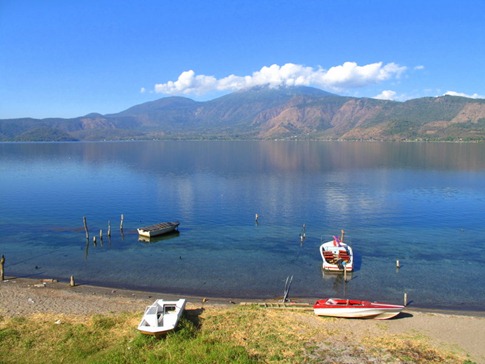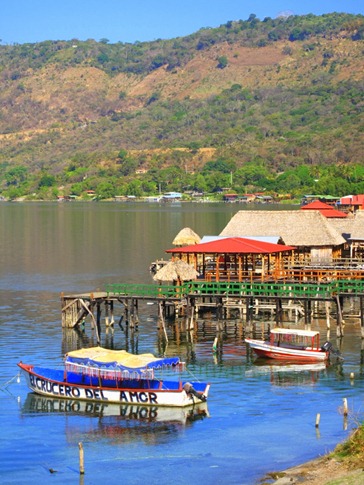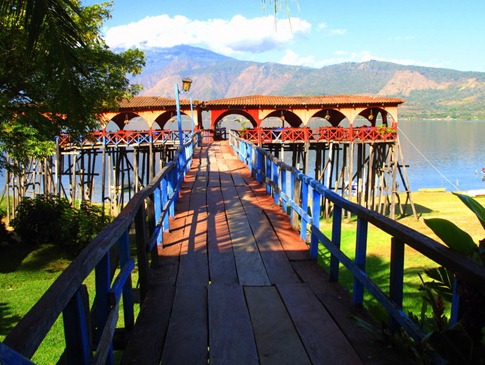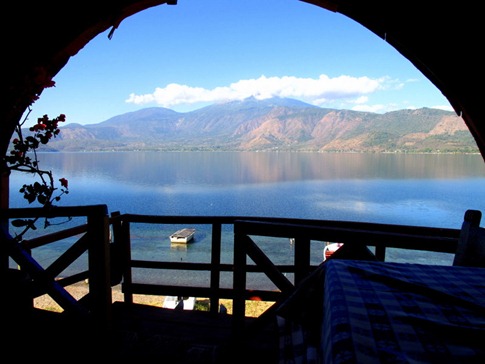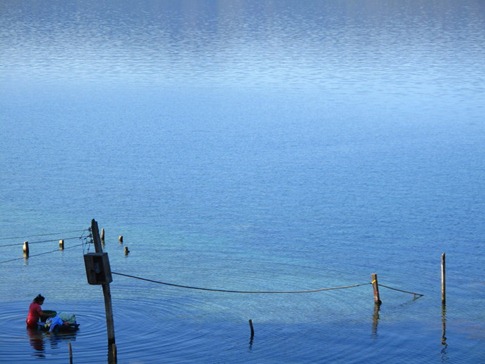For some reason, driving out of Tacuba and the Bosque El Imposible, we were feeling particularly at home in El Salvador. It could have been Mama’s hospitality and “mi casa es su casa” attitude or just being at the point in our trip where we were getting the hang of it. So, when bumping along a cobblestone backstreet, when a man waved us down, I rolled down the passenger window to see what we could do for him. He stuck his drunken and toothless head all the way inside the window towards Ann and stretched out his grimy hand for money. What was I thinking? We have to be more careful.
El Salvador’s a tiny country; Drive 4 hours in any direction and you’ll pretty much hit a border. While our goal was the northern crossing into Honduras at El Poy, we thought we’d zig zag a little to see a few sights. The family we’d talked to at the hostel the other night had just come from climbing Cerro Verde in the Parque Nacional de los Volcanoes. Also in the park was Volcan Izalco, having grown from a bump in the ground to a 6,000 ft tall, perfectly conical volcano in only the past 200 years, and we thought the area and nearby Lago de Coatepeque would be a good stopover.
We backtracked the Ruta de las Flores, this time stopping in Juayua for their Feria Gastronomica, a street food festival centered on the main square of town. A full plate of barbequed ribs and papusas later, and our opinion was starting to change. We also started down a road just past Ahuachapan to see some thermal vents called "ausoles” that they had harnessed to generate power. We caught a glimpse of them before too long, puffing white steam that looked like a smokestack from the green hillside in front of us, but decided we didn’t need to drive all the way there just to stare at a buncha ”ausoles.”
Spoiler alert: If you’re cursing the lack of pictures in the list post right now, you’re gonna feel like a douche in a few paragraphs…
Continuing east from Sonsonate, the volcanoes rose to the north before we took a small junction road towards the national park entrance and the lake beyond. Though narrow and riddled with potholes, I made a mental note to suggest the road to Tree and Stevie. We took the left turn at a sign for Cerro Verde and continued a curvy road. A few miles up, a view from high above Lago de Coatepeque opened up at a “mirador,” scenic vista points with a raised viewing platform and a parking area. Like we had a few times already that day and many more times along the coast, we pulled in, grabbed the camera and walked to the edge.
When we turned around, three men were walking towards us, one wearing a black ski mask and two carrying machetes. Talking about it later, we both had the same thought, “A ski mask? In this heat? That’s really weird.” And I should also mention that just about everyone around here is carrying a machete, both for field work and for protection. The two with the machetes came towards me saying “Moneda! Moneda!” demanding money while the other stood near Ann. I tried to stand my ground, yelling “NO!” as loud as I could while they shushed me, but the presence of twitchy machetes surely resulted in at least a few steps back as they came towards me. I patted my pockets and told them, “No tengo nada,” even giving one of them the $0.40 I did have to make the point.
When they turned their attention to the camera in my hand, I refused once again and briefly considered throwing it to Ann though I didn’t want them going after her. Until now, the third guy had just been telling Ann to be quiet and that everything was going to be okay. I thought about throwing it into the bushes as well, but with each second, the threatening hacks at the air with their machetes seemed to grow more frantic, and I was conscious of not wanting them to panic and escalate things. Though the machetes looked a little rusty, in the heat of moment I couldn’t remember whether I’d gotten a tetanus booster before the trip and didn’t want to take any chances. After a hard swack on my left shoulder with the flat blade of the 16 inch knife, I handed it over.
The leader then started pointing at my hand and yelling “feria!” I assured him I wasn’t wearing a watch and passed my hands over my wrists like a magician showing he had nothing up his sleeve. While I later learned that “feria” is slang for money, it was quite clear he wanted my wedding ring. Despite a few stretching sessions with my sister-in-law Meghan who had made the rings for us just 4 months before, my ring was still quite tight, and I tugged at it for show adding “No puedo!” or “I can’t!” As he persisted, I saw over his shoulder the third guy approaching the passenger door of the truck. I reached into my pocket for the alarm clicker but got to it a second after he’d opened the door. In hindsight, I wish I’d thought to press the panic button – you know, the one you always hit by accident as you’re walking out to your car – which would have likely sent them scrambling. But now, feeling the leader’s eyes on the car keys, I stuck my finger in my mouth up to the knuckle to loosen the ring. He grabbed it, and for a moment we were in a tug of war until it slipped over my knuckle, sending him a few steps back.
Without much thought to my next action, I said, “Okay, we’re going now,” in the most confident voice I could muster. I have no idea why, but they were convinced and spread out. We jumped in the truck and peeled out of the parking lot. Now racing up the hill towards Cerro Verde, our plan was to get to the entry gate to find a guard or cop or something. A minute later, we saw a light bar on the top of an SUV coming the other direction and flagged them down. They were Tourist Police, a branch of the Policia National Civil, and raced off back down the hill towards the mirador as we continued up. Feeling the like road was only getting more remote, we turned around and saw the Tourist Police truck parked by the side of the road above the mirador, presumably with the officers searching on foot. We continued down the hill where we found a Policia National Civil post and mustered every bit of Spanish in the past tense we could to tell them what had happened.
In the end, we lost the camera, an iPhone and an old Motorola phone, my ring and $0.40. I have no idea why the guy in the car didn’t take the GPS or any of a few other things in the glove compartment. We have a backup camera, another iPhone for podcasts and a sister-in-law who can recreate the ring with all the same sentiment as the original. In fact, we’d had her make Ann a “travel ring” with some modest inset diamonds which she’d recently decided to stop wearing. I’d said from the beginning that I wasn’t willing to leave my ring at home just on the small chance something that would happen and still feel the same way. Oh, and the $0.40, we’ll just never see again.
Of course, the main affect of the unfortunate incident came not from the loss of things, we knew that was somewhat likely to happen at some point, but rather the threat of violence and the unshakeable question of “What if things had gone differently?” On one level you wonder what you did wrong. Should we not have pulled off at that mirador with no one around? It was along a main road passing through houses and we didn’t feel particularly remote. We’ve discussed that we wouldn’t have stopped if two guys were sitting in their car there or on the platform having a smoke. Should we have fought back more? Led them to the car where I could grab the heavy 4-cell Maglite mounted on the door and start swinging? Or use the can of ant spray we bought last week after hearing about others keeping one handy for self-defense? Well, you’d better be sure you can get all three of them if you escalate the situation and with Ann on the far side of the truck with another one of them, it wasn’t worth it. We’d talked about this scenario before leaving and decided that in 99% of the cases, they don’t want to hurt anyone, just get the money and go; We’d promised ourselves and family that we’d just hand it over, that’s pretty much what we did.
Our guard had certainly been a little down since the beginning of the day, though I don’t think there was any way we could have known that three guys were hiding around a corner down a dirt road waiting for a tourist to get out to take a picture of the view. And on that topic, how many pictures of that view must be on all the cameras they’ve stolen? At least they could do something artsy like put them all in a collage online somewhere. And walking down a street in San Francisco or New York or Boston, you can be careful, but you still never know when someone could emerge from a dark door way or alley. We’d been trading stories with other travellers over dinner a few nights before and had acknowledged that in decades of life, living in cities, going out with friends, walking through parks, not to mention traveling extensively, neither of us had ever been mugged. I guess we were just due, and to be honest, though it’s always going to be traumatic when something like this happens, I think I would actually prefer this scenario to a guy with a gun blocks away from my house. Plus, machetes and a ski mask makes a much better story…
After following an officer on a motorcycle from the first police post to a larger one in El Congo 15 minutes away, we filled out a “denuncia.” The investigator, wearing jeans, imitation Timberland boots and a police T-shirt, hunted and pecked on a Compaq desktop computer as he entered our information. Unfortunately, he was having trouble printing the report double sided. He’d print page one of the report, flip the paper over and then go to print page two only to find that his template had cleared and he’d lost everything he’d typed. After he’d retyped everything in a third time, Ann and I stepped in, first showing him how to copy the description of the crime he’d worked so hard on to the clipboard and then how to print both pages, flipping the paper quickly while the printer was in between. Despite their computer skills, in general the police were very attentive and concerned that the incident had occurred.
We spent the night on Lago do Coatepeque, still jittery as we drove a secluded- feeling dirt road to the only hotel recommended in either of our books. Anyone approaching us selling bananas or offering to wash the windshield at that point might have found themselves with a backwards imprint of a Nissan logo on their forehead. Despite the lake being really quite beautiful, we pretty much holed up in the shabby room until morning. We had breakfast out on the rickety covered deck overlooking the lake. We could feel the flex in the wooden structure, reminiscent of an old rollercoaster, from the moment the 110 pound waitress set foot on it with our coffee and orange juice and spent most of our meal discussion which way to jump if the whole thing started to go.
Please look at these pictures to calm down a little. It worked (a little) on us at the time.
As some point while filling out the denuncia the day before, we’d agreed to return for an entrevisto, an interview, with another investigator. The whole experience had pushed our Spanish speaking and comprehension skills about to the brink, but the investigator was careful to make sure we understood when he came to the end. He made it clear that if we considered ourselves “offended,” the central office in San Salvador could require that we go to the capital at any time to give more information or look at mug shots. Feeling at the time like we wanted to be out of the country as soon as possible, we acknowledged that we likely wouldn’t have been able to identify any of them – we’re not racist but they were all brown with black hair, oh, and one of them looked like he was about to go skiing in 1980 – and were not willing to follow up.
As we were leaving the hotel in the morning, a boy had approached us. He’d heard us talking to a woman at the hotel about the robbery. (Sorry, off-topic detail but our senses were a bit heightened at the time and we couldn’t help but noticing that the woman was a transvestite, pretty rare in Latin America, especially in the sticks.) Anyway, the boy said he knew the guys who’d done it and that they lived in Lago de Coatepeque. We pressed him, and he acknowledged that he didn’t know the guys but knew they lived there. Before leaving the station, I mentioned this to the investigator and gave him a lecture in my best Spanish about how I had a feeling they knew exactly who these guys were, that they’d done this before and that tourists were not going to be coming back here if this kind of thing continued. He asked if there was anyway he could get in touch with the boy. We said no. He replied that people who talk to the police about crimes in their neighborhoods have a way of showing up with their heads cut off. Okay, enough of that then. We left the police station glad we’d given them a fake home address back in the US.
But El Salvador wasn’t done with us for the day. As we went make a left turn onto Pan American Highway heading south, a police office was blocking the on-ramp. I’ll admit we were still in something of a flight mode at this point so when we flipped a U-turn and approached from the other direction, we drove right past another officer who only weakly raised a hand to stop us. We roared up to 80 km/hr down the completely empty highway. Too empty in fact. After 20 minutes, trucks started backing up on the sides of the road and it was clear something was up. A roadblock? After narrowly missing roadblocks set up by the cartels outside of Morelia two and a half months before, we’d said we’d just pay attention what the locals did, and these locals were stopped cold. When we saw flashing lights and people in the highway in front of us, we were heading the other direction faster than you could say “paranoid gringo.”
Back at the police station in El Congo, they didn’t seem very surprised to see us. Everyone was in the back room watching TV and when we walked in, one guy stood up and offered Ann a chair, then went to get one for me. On the TV was live coverage of an accident involving a truck and three busses just south of El Congo. Over a hundred people had been injured and 11 killed when a truck hit a broken down bus, pushing it into the road where another bus loaded with passengers hit it. A third bus went off the road and hit a tree trying to avoid the first two.
The police assured us that traffic would be snarled for hours, so we consulted on an alternate route north and then south back through Sonsonate, somewhat familiar territory to us at this point. With heads on swivels and nerves a bit frayed, we connected with CA-2 and drove straight to El Tunco on the coast where we knew we had friends and a safe place to stay. By 5:00, we were moved back into our room at the Hotel Eco del Mar and telling the story to Tree and Stevie and Chad and Emily with a glass of straight rum in our hands and the sun setting on an “unfortunate” chapter of the trip.
A few takeaways for travelers:
- Talk to your travel companion(s) about various scenarios and make sure you’re on the same page about how you will handle them.
- Ask for a tourist police escort when you don’t feel comfortable. They seemed to indicate that they would have been happy to have done it.
- Don’t carry documents, especially not originals, on you. The police were surprised they hadn’t taken our passports. Fortunately, they were hidden away pretty deep in the truck.
- Keep your valuables secured in your truck at all times while on the road. In our case, while a few things were loose, laptops, documents, and everything else of value was behind at least one padlock in the truck and would have taken a while for them to get or even to force us to get. Time they’re hopefully not willing to spend.
- Lock your car when you’re not in it, even at a two minute stop.
- Save your pictures off your camera often. I do it regularly and had just downloaded everything the night before. That would have been the second most tragic loss in our case.
- Be careful about getting lax about any of the above.

